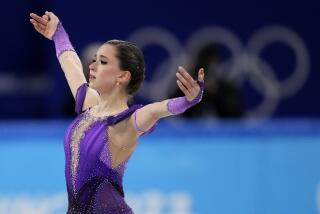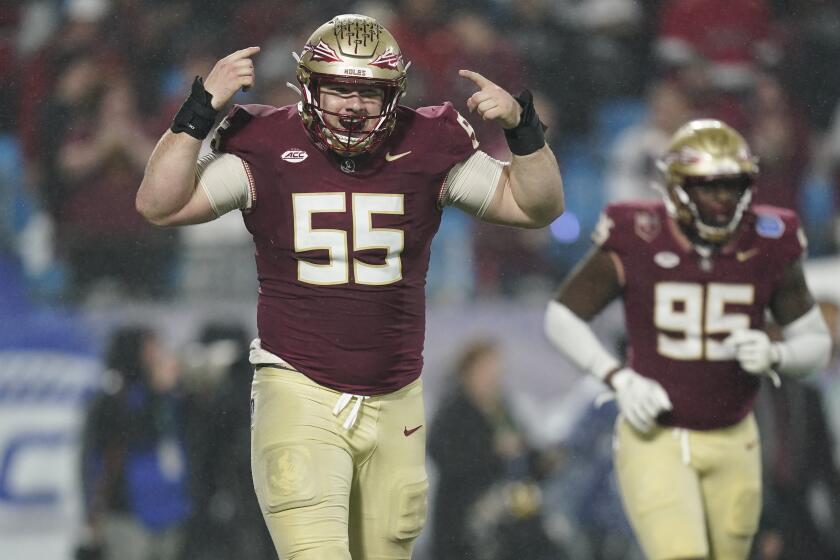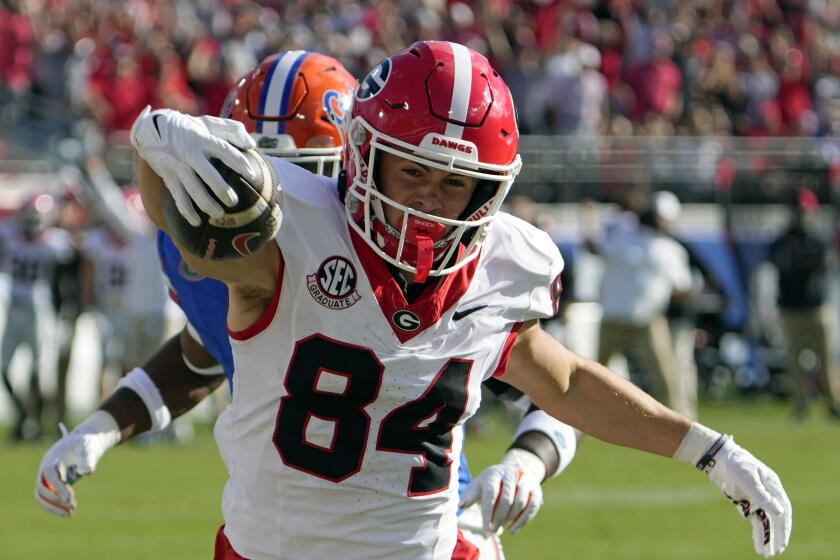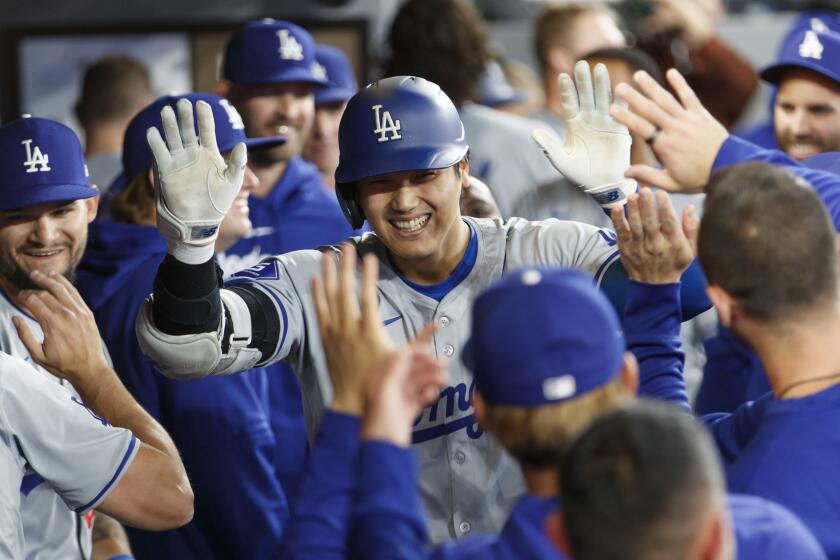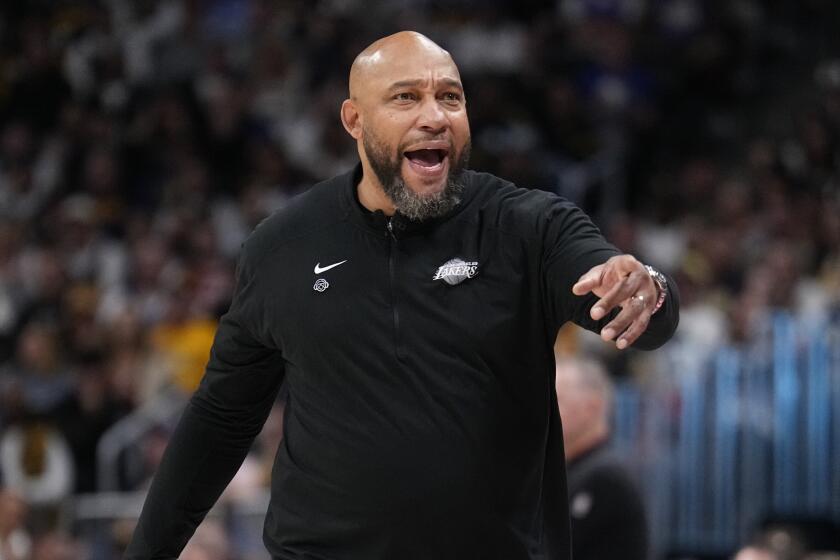Team Canada’s Sochi roster features 11 returning gold medalists
From mighty Canada with its 11 returning gold medalists to humble hopefuls Latvia and Norway, the remaining entrants in the Sochi Olympic hockey tournament announced their rosters Tuesday, triggering vigorous debate in hockey rinks around the world.
Kings defenseman Drew Doughty’s second straight selection for Canada was automatic, but forward Jeff Carter was a mild surprise. The Kings will have six Olympians, with host Russia choosing defenseman Slava Voynov, and the previous picks of center Anze Kopitar for Slovenia and goaltender Jonathan Quick and forward Dustin Brown by Team USA.
“Any time you get to represent Canada and put on that jersey, it’s the biggest honor ever, really,” Doughty said. “I’m so excited to be finally named.”
The Ducks have seven Olympians, including center Ryan Getzlaf and Corey Perry returning from Canada’s 2010 championship team. Finland chose 43-year-old winger Teemu Selanne, who will tie an Olympic hockey record with his sixth appearance, and also chose Ducks defenseman Sami Vatanen. “We play for him,” Vatanen said of Selanne. “It might be his last Olympics. You never know.”
Selanne called his selection “a big honor, again,” but teammate Saku Koivu declined the honor to rest and train for what he hopes will be a long playoff run by the Ducks.
“Physically, I won’t be where I want to be to compete against the best players in the world,” Koivu said, calling it the toughest decision of his career. “It was a dream, but the older you get, you have to stay honest with yourself.”
Also on Tuesday, Ducks winger Jakob Silfverberg was chosen to play for Sweden. Defenseman Cam Fowler was previously named to Team USA and goaltender Jonas Hiller was named to Team Switzerland.
The St. Louis Blues, Detroit Red Wings and defending Stanley Cup champion Chicago Blackhawks each had 10 players selected.
Russia, under pressure to win at home, named 15 NHL players, including goalies Sergei Bobrovsky of Columbus and Semyon Varlamov of Colorado. The remaining 10 come from the Kontinental Hockey League. The NHL contingent includes goalscoring leader Alexander Ovechkin of the Washington Capitals and dazzling Pavel Datsyuk of the Red Wings, as well as 18-year-old standout forward Valeri Nichushkin of Dallas. Winger Ilya Kovalchuk, who left the New Jersey Devils after last season to play for SKA St. Petersburg, also made the team.
“I’m very proud for myself and very proud for my family. It’s huge,” Ovechkin told reporters in Washington.
Who was left off Canada’s roster caused as much of a stir as who was on it.
San Jose center Joe Thornton, the NHL’s assist leader, didn’t make it. Nor did Philadelphia Flyers forward Claude Giroux or defending NHL scoring champion Martin St. Louis of the Tampa Bay Lightning. That last omission was tricky, because Team Canada’s executive director, Steve Yzerman, is also the Lightning’s general manager and had to deliver the bad news to St. Louis.
Canada went for a mobile defense, unlike previous Olympics. Doughty will be joined by Montreal’s P.K. Subban, Chicago’s Duncan Keith, St. Louis’ Jay Bouwmeester and Alex Pietrangelo, steady Dan Hamhuis of Vancouver, Marc-Edouard Vlasic of San Jose and Nashville stalwart Shea Weber.
Up front, Dallas’ Jamie Benn won a spot for his recent production and New York Rangers winger Rick Nash won a spot despite his scoring woes. Canada’s centers are its strength: Boston’s Patrice Bergeron, Pittsburgh’s Sidney Crosby, Getzlaf, the New York Islanders’ John Tavares and Chicago’s Jonathan Toews.
The selection of Crosby’s left wing, Chris Kunitz, drew some fire but Kunitz brings production and physicality. Carter’s quick shot and ability to bring much-needed speed on the wing worked in his favor.
“Everyone knows what Canadians expect. Anything but gold is unacceptable,” Perry said. “That’s the way we look at it.”
Canada’s biggest challenges loom from the U.S., always-skillful Sweden — led by five-time Olympian Daniel Alfredsson — and Finland, with remarkable goaltending depth in Dallas’ Kari Lehtonen, San Jose’s Antti Niemi, and Boston’s Tuukka Rask.
“We are not the favorites, but the gap between the best team and the sixth team is not very big,” said Selanne, who made his Finnish Olympic debut in 1992 and has won a silver medal and two bronze medals. “Anybody can beat anybody.”
Times staff writers Lisa Dillman and Lance Pugmire contributed to this report.
Twitter: @helenenothelen
atimes.com”>helene.elliott@latimes.com
Twitter: @helenenothelen
ville stalwart Shea Weber.
Up front, Dallas’ Jamie Benn won a spot for his recent production and New York Rangers winger Rick Nash won a spot despite his scoring woes. Canada’s centers are its strength: Boston’s Patrice Bergeron, Pittsburgh’s Sidney Crosby, Getzlaf, the New York Islanders’ John Tavares and Chicago’s Jonathan Toews.
The selection of Crosby’s left wing, Chris Kunitz, drew some fire but Kunitz brings production and physicality. Carter’s quick shot and ability to bring much-needed speed on the wing worked in his favor.
“Everyone knows what Canadians expect. Anything but gold is unacceptable,” Perry said. “That’s the way we look at it.”
Canada’s biggest challenges loom from the U.S., always-skillful Sweden — led by five-time Olympian Daniel Alfredsson — and Finland, with remarkable goaltending depth in Dallas’ Kari Lehtonen, San Jose’s Antti Niemi, and Boston’s Tuukka Rask.
“We are not the favorites, but the gap between the best team and the sixth team is not very big,” said Selanne, who made his Finnish Olympic debut in 1992 and has won a silver medal and two bronze medals. “Anybody can beat anybody.”
Times staff writers Lisa Dillman and Lance Pugmire contributed to this report.
Twitter: @helenenothelen
atimes.com”>helene.elliott@latimes.com
Twitter: @helenenothelen
More to Read
Get our high school sports newsletter
Prep Rally is devoted to the SoCal high school sports experience, bringing you scores, stories and a behind-the-scenes look at what makes prep sports so popular.
You may occasionally receive promotional content from the Los Angeles Times.


